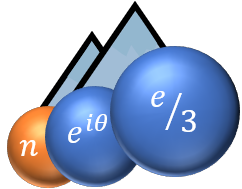The electrostatic energy is very often the largest energy in a condensed matter system. Yet, it is very often simply ignored or considered with a toy model external potential. Taking into account the electrostatic energy can provide quantitative theories where the electric potential seen by the electrons is calculated as a function of, e.g., the voltages applied to the different electrodes. In some cases, as in quantum Hall effect, it is actually needed at the qualitative level.
In this talk, I will discuss our recent numerical efforts to calculate the reconstruction of the Landauer-Buttiker edge states into compressible and incompressible stripes that occurs as soon as the electrostatic energy is properly taken into account in quantum Hall devices. In particular, I will discuss recent experiments that implement a Mach-Zehnder electronic interferometer in a graphene pn-junction and showcase the role of the exchange interaction there.
[1] Reconciling edge states with compressible stripes in a ballistic mesoscopic conductor. Pacome Armagnat and Xavier Waintal 2020 J. Phys. Mater. 3 02LT01
[2] The self-consistent quantum-electrostatic problem in strongly non-linear regime. Pacome Armagnat, A. Lacerda-Santos, Benoit Rossignol, Christoph Groth and Xavier Waintal SciPost Phys. 7, 031 (2019)
[3] Positioning of edge states in a quantum Hall graphene pn junction. I. M. Flór , A. Lacerda-Santos, G. Fleury , P. Roulleau, and X. Waintal. PHYSICAL REVIEW B 105, L241409 (2022)

 PDF version
PDF version
